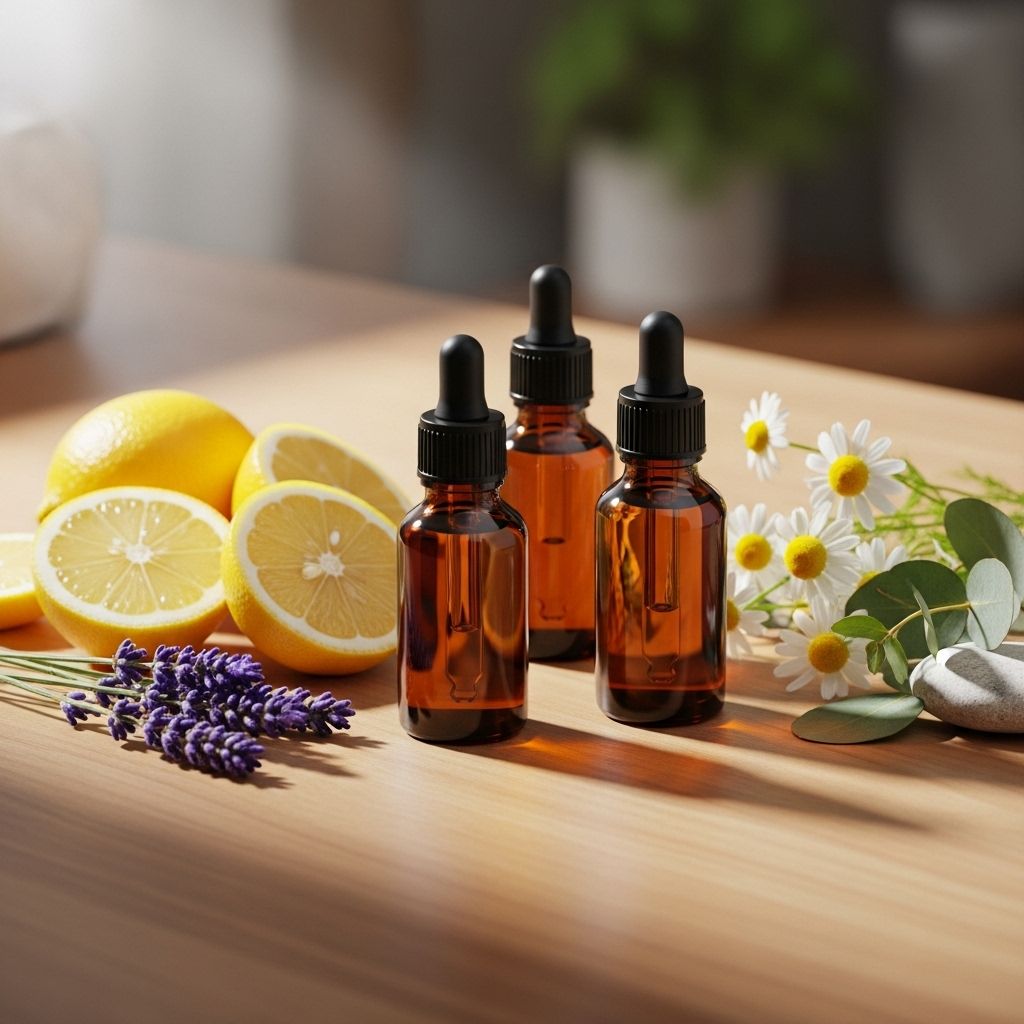Aromatherapy for Stress & Anxiety: The Power of Essential Oils
Elevate your daily calm with plant-derived scents that ease tension and restore balance.

Aromatherapy: Essential Oils for Stress & Anxiety
Aromatherapy, the practice of using essential oils to promote relaxation and reduce stress, has gained significant attention in recent years. This holistic approach to managing anxiety and stress has been supported by various studies, highlighting the therapeutic benefits of essential oils in improving mental health and well-being. In this article, we will delve into the world of aromatherapy, exploring its stress-reducing benefits and discussing the most effective essential oils for anxiety management.
## Introduction to Aromatherapy
Aromatherapy involves the use of essential oils derived from plants to stimulate the brain’s limbic system, which controls emotions. These oils can be inhaled directly or applied topically with a carrier oil, allowing individuals to experience a range of benefits, from relaxation to improved mood. The science behind aromatherapy is rooted in the physiological responses triggered by smelling these concentrated plant extracts.
## Benefits of Aromatherapy for Stress and Anxiety
Long-term stress and anxiety can have detrimental effects on physical and mental health. Aromatherapy offers a natural and accessible way to manage these conditions. Studies have shown that aromatherapy can reduce pain, depression, and anxiety, making it a valuable complement to traditional treatments.
## Essential Oils for Stress Relief and Anxiety Management
Lavender Oil
Lavender is one of the most popular essential oils used in aromatherapy. It is known for its calming effects, helping to reduce stress and promote better sleep. Lavender oil can be used in baths, diffusers, or applied topically to calm the nervous system and lower blood pressure.
Jasmine Oil
Jasmine oil has a stimulating yet calming effect, promoting a sense of well-being without causing sleepiness. It is often used to regulate mood and can be inhaled directly or diffused into the air.
Sweet Basil Oil
Sweet basil oil is known for its herbal scent and is believed to help calm the mind and relieve stress. While research is limited, it shows promise in reducing anxiety.
## How to Use Essential Oils in Aromatherapy
Essential oils can be used in various ways to benefit from their therapeutic effects:
- Diffusers: Add a few drops of essential oil to a diffuser to fill the air with its scent, promoting relaxation and reducing stress.
- Bath Soaks: Mix essential oils with carrier oils or bath gels for a calming bath experience.
- Topical Application: Dilute essential oils in carrier oils and apply them to skin or pulse points for localized benefits.
- Direct Inhalation: Inhale essential oils directly from the bottle or through a handkerchief.
## Physiological Effects of Essential Oils
Essential oils can have profound physiological effects on the body. For instance, lavender oil has been shown to lower cortisol levels, reduce heart rate, and improve sleep quality. Other oils, like peppermint and rosemary, have stimulating effects, improving alertness and cognitive function.
Autonomic Nervous System (ANS) and Stress Hormones
The autonomic nervous system plays a crucial role in responding to stress. Essential oils like bergamot and yuzu can modify ANS activity, reducing stress hormones like cortisol and promoting relaxation.
## Frequently Asked Questions (FAQs)
Q: What are the benefits of using essential oils for stress and anxiety?
A: Essential oils, such as lavender and jasmine, can help reduce stress and anxiety by promoting relaxation, improving mood, and enhancing sleep quality.
Q: How do I choose the right essential oil for stress relief?
A: Select oils based on their calming properties (e.g., lavender) or mood-enhancing effects (e.g., jasmine). Always dilute essential oils in carrier oils for topical use.
Q: Are essential oils safe to use?
A: Generally, essential oils are safe when used properly. However, consult a healthcare professional before using them, especially if you have allergies or are pregnant.
## Conclusion
Aromatherapy offers a holistic approach to managing stress and anxiety, leveraging the therapeutic benefits of essential oils. By understanding how different oils can promote relaxation and improve mood, individuals can incorporate aromatherapy into their daily routines as a natural complement to traditional stress management techniques.
References
- https://inspirseniorliving.com/senior-living-resources/stress-reducing-benefits-aromatherapy
- https://pmc.ncbi.nlm.nih.gov/articles/PMC10180368/
- https://www.healthline.com/health/anxiety/essential-oils-for-anxiety
- https://www.webmd.com/balance/stress-management/aromatherapy-overview
- https://www.medicalnewstoday.com/articles/324478
- https://pmc.ncbi.nlm.nih.gov/articles/PMC4329734/
- https://my.clevelandclinic.org/health/treatments/aromatherapy
Read full bio of Sneha Tete












